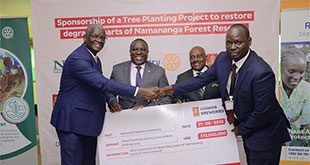
Kampala, Uganda | THE INDEPENDENT | The Chinese Ambassador to Zhang Lizhong has said his country is to fund to the tune of US$ 5 million (Shillings 18.5 billion) the expansion and renovation of China-Uganda Friendship Hospital Naguru. Speaking to senior editors from different media organizations at the Chinese Embassy in Kampala, Lizhong said this donation is one of the fruits of the Forum on China-Africa Cooperation [FOCAC].
“Under the FOCAC framework, China plans to provide US$ 5 million to expand and renovate China-Uganda Friendship Hospital. We are discussing the feasible proposal with the Ugandan government,” Lizhong said. The ambassador said his government has been a pivot in assisting Uganda to find solutions in the health sector.
“China offered emergency medical aid by providing batches of anti-malaria drugs and COVID-19 vaccines during the pandemic to help Uganda contain the outbreak of diseases and eliminate some tropical diseases. Currently, China dispatches medical teams to Uganda every year. They are working together with Ugandan doctors in China-Uganda Friendship Hospital, to perform thousands of surgeries and outpatient consultations. They also go to the countryside and the schools to offer free medical services,” Lizhong said.
The ambassador also said investors from China and the Chinese state-owned companies have heavily invested in other different sectors of the Ugandan economy that have not only helped in social economic transformation but also created thousands of jobs. In recent years, Chinese enterprises have actively participated in the Belt Road Initiative with fruitful results and contributed to the economic and social development in Uganda.
Several dynamic industrial parks have been established, bringing thousands of job opportunities to the local youth and affordable local products to the local communities. In the field of infrastructure, Chinese enterprises have completed several landmark projects. Take the Kampala Entebbe Expressway as an example. “This is the first expressway collecting tolls in Uganda, financed by a Chinese bank and constructed by a Chinese company. It has good economic results, bringing over US$1 million in income per month and promoting the mobility of personnel,” Lizhong said.
The ambassador also said that China has also opened up its market to Ugandan agricultural products many of whom can be exported tariff-free. He called upon Ugandan companies to use this opportunity to tap into the very big Chinese market.
“Expanding export of Ugandan agro-products to China is beneficial to both nations. China is committed to opening its market wider. By the end of 2023, trade volume between Uganda and China grew to $1.3 billion, of which Uganda’s exports to China increased by 19.6%. During the week-long China International Import Expo last November, Ugandan companies signed deals to supply the Chinese market with over 30tons of roasted coffee and another 29 containers of green coffee beans. China and Uganda have already signed exchange notes that 98% of Ugandan products under tariff codes are duty-free when exported to China. We hope the Ugandan side will make the most use of the agreement and achieve its export goals,” Lizhong said.
On the FOCAC which is going to take place in China from September 4-6 under the theme, “Joining hands to modernization and build a high-level China-Africa community with a shared future,” Lizhong said there have been many tangible outcomes to many African countries.
“Since its establishment [2000], the FOCAC has been dedicated to achieving common prosperity and sustainable development for the people of China and Africa. Adhering to the principles of extensive consultation, joint contribution, and shared benefits, it has evolved into a crucial platform for collective dialogue and an effective mechanism for practical cooperation…China and Africa have been assisting each other on the path to economic development and national rejuvenation, continuously expanding cooperation into new areas,” Lizhong said.
The ambassador said, unlike other international development partners, China’s interventions are based on the needs of the country in question and are not imposed. When asked about China’s silence when it comes to human rights violations in Uganda, Lizhong said as a policy, stays away from meddling. “We don’t interfere in the internal affairs of any country in the name of human rights. I know Uganda can protect the human rights of its people and we don’t have to get involved,” Lizhong said.
 The Independent Uganda: You get the Truth we Pay the Price
The Independent Uganda: You get the Truth we Pay the Price



